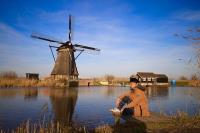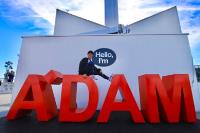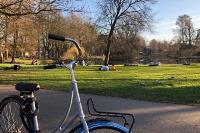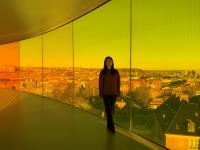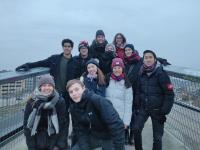Generally speaking, I think the courses at Utrecht University (UU) cover a wider spectrum of knowledge and we will have many opportunities to encounter more case studies and examples. For example, I took a course about natural hazards. Originally, I had thought that it was all about issues I had already encountered in secondary school. However, actually it covered more than that, such as impacts from extraterrestrial bodies, benefits and cost analysis, etc. All of these were novel to me. Apart from the course content, the course evaluation system also impressed me a lot. Aside from the normal evaluation at the end of the course, there was a course evaluation feedback group which met occasionally during the course, around once a month, to let the instructors know in time if students faced any problems during the course and how to improve the course. This is a practice similar in intention to but more direct than the mid-course feedback implemented in CUHK, in providing a platform for students to raise their concerns and opinions, and a chance for the lecturers to know better what the students expect during the course and what they could do for improvement.
Indeed, I encountered some academic difficulties during my exchange programme at UU. For example, the format of tutorials at UU is very different from that at CUHK. At CUHK, the tutorials are usually for students to learn a bit more beyond the lectures or ask the tutors some more in-depth questions, and the tutorials are conducted by the tutors, who usually give us 'mini' lectures or some practical exercise. However, at UU, tutorials are actually for students to self-study, self-work, or gather and discuss group assignments or projects, while the tutors are just auxiliary. They do not often lead the tutorials, but just answer questions and provide assistance as needed. Some may think this kind of tutorials is quite free for students, as we can arrange by ourselves what to do in class. However, for me, I did not prefer doing my work in class, especially when my classmates were having discussions. It was a bit noisy which kept distracting me from what I was supposed to do. My productivity during the tutorials was much lower than in the library or my own room. Therefore, I was not used to attending the tutorials at UU.
Despite the academic difficulties, I had many memorable moments in the Netherlands. For example, I love the fact that cycling is one of the most common modes of transport in the country. Cycling tracks and relevant facilities, such as bike parking, be it indoor or outdoor, can therefore be easily found all around. As a Geography student, I do appreciate a lot Dutch people's preference for cycling, as it really keeps the air quality better and uses less energy, and most importantly, it saves a lot of their transportation cost: It costs around two euros for each bus journey to the city centre, which is just around a 20-minute cycling distance; however, a bike rental costs only 12 euros for a whole month. You can tell how much people who commute by cycling can save.
Regarding my insights into Dutch culture, there are indeed a few points I am quite surprised at. First of all, the Dutch, or generally the Europeans, do not really have a full lunch, by our standards. We might think that having a lunch means having rice or pasta with drinks or soup, but this is not the case in Europe. Lunches are often only sandwiches or bread. They do not really have that kind of 'Western' lunches that we usually do in Hong Kong. Therefore, it was sometimes not easy for me to get a more stomach-filling lunch. I did not much like sandwiches and breads as they were too cold and dry for me, especially in winter when I always craved hot dishes. Another point is the public behaviour of the Europeans. In Hong Kong, it is selfish to put your feet in shoes on chairs in public places. However, this behaviour is indeed very common in Europe. Some people also put their bags on the chairs next to them when they are travelling in trains or buses. As a result, a person often occupies two seats, while some people in need have none.
Academic Exchange at Aarhus University, Denmark (Ms YIU Sze Hang Justina, Year 3, Professional Accountancy)
Denmark is known as one of the happiest countries in the world. After spending five months in the country, I would say that if you understand their cultures, you will know why Danes are happy. Trust and equality are two keywords for Danish culture. In Denmark, it is very common for parents to do shopping or have a meal and leave their children in baby prams outside a shop or restaurant. As a Chinese, I was always worried that the babies might be taken away or harmed. However, it is actually fine to leave your personal belongings and even children in a public place, because Danes are considered some of the most trusting people in the world. When people trust others, they are happier in general. Gender equality is always a thing to the Danes. Women are empowered to express their thoughts in the workplace. Danish girls are often the proactive one in a relationship. The concept of equality can also be observed in daily life. For instance, the staff of a shop or restaurant would definitely ask a couple whether the bill is to be split. In general, when people feel that they are all treated fairly, they have less discontent but more satisfaction and happiness.
Reflecting upon my journey, first of all, I am grateful that I was exposed to new ways of learning which are beneficial to my future studies. The exchange programme allowed me to acquire knowledge in a learning atmosphere and through ways of teaching very different from Hong Kong. The classes were interactive and the assignments required our knowledge application and reflective thinking. I was able to adopt multi-faceted approaches to learning while exchanging ideas and perspectives with local and international students in class. Moreover, now I have greater awareness of global issues, such as the European Parliament Election.
Besides, I am better equipped with cross-cultural skills for my future career. In a globalised world, people are expected to be comfortable with multinational and multicultural working environments. As I aspire to work in the business field after graduation, the exchange programme enhanced my flexibility to adapt to a new environment and cooperate with foreign counterparts. I became familiarised with their mindsets and mode of work during in-class discussions. Most importantly, Denmark provided a good environment for me to practise my spoken English. Fluent oral communication in English will put me in a better position compared with other job candidates. Although I failed to learn Danish, I have got used to being comfortable in an environment filled with foreign languages and engaging myself whenever possible.
Finally, the exchange opportunity fostered my personal development. Without my friends and family around, I had to take care of my daily life, for example, laundry and cooking. I can now make simple dishes which I was not motivated to because my mother takes care of everything at home. Also, I learnt to cope with loneliness and homesickness when I was far from home. The experiences are valuable to strengthening my independence in coping with difficulties ahead. As I lived in a student dormitory with more Danish students than international students, I had a lot of chances to interact with them in common areas. We shared food and talked about our dreams. Sometimes, I had to take the initiative to start a conversation and I am grateful that I plucked up the courage to step out of my comfort zone. I believe that my strong adaptability is an edge for me to find the right position in dynamic situations and do well.
My exchange journey has come to an end. I am thankful that I built skills and friendships which are beneficial to my future. Living alone in a foreign country is a big challenge but it was a precious opportunity for me to reflect on my habits and my future goals. I started to know what I want in a career and as a person in the future. The journey is a unique and memorable experience which I am always proud and happy to share with everyone.



















